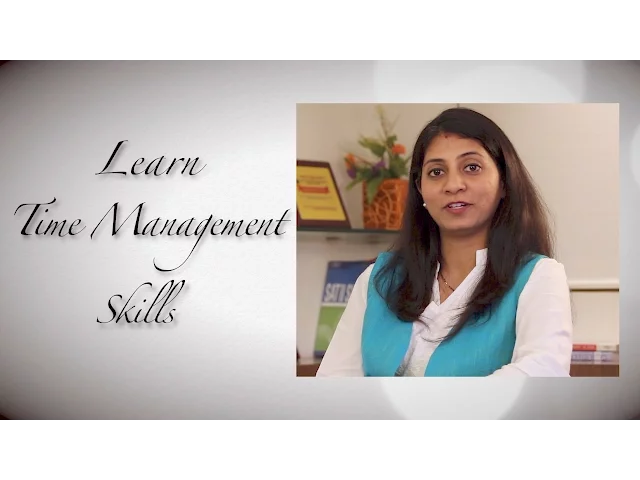Time Management
Importance of Effective Time Management
“We wanted to do something special and valuable this Children’s Day for our society kids. We feel that the students today desperately need help with managing time. The Time Management Workshop by Growth Centre turned out to be the ideal choice for them. Parents and even kids came up and thanked us for arranging these sessions. The kids said that it was a very interesting session with activities involved.” – Delighted Society Chairman, Mumbai
‘Race against time’ is the everyday mantra we begin with. Keeping up with this mantra can sometimes become extremely challenging. The wheel of time is constantly running, thus today it has become vital to learn the skill of balancing its speed and control in our lives.
Effective Time Management: Key to a Smooth and Healthy Life
- If Life is like a game and time is money, everybody is a rich participant at the beginning of the day. And success lies in the strategic planning for smart utilization of this money by individual participants.
- But it is not as difficult as it sounds. Everyone is playing this game every day. It’s just in revisiting the game plan and making a few changes in the patterns that could help in ensuring personal victory.
- There are so many occasions that one can think of, when a certain task is put off ‘to be done later’ as it might take too long. But then it turns out that it gets done sooner than you expected! Or incidents when stress builds up as a result of not being able to complete a certain task that was not ‘supposed take too long’.
- From the very first day of your school life, you experience time management in the form of time-table provided by the school. Subjects were taught by school teachers in a set time period. This shall continue even in your job. You have a set of working hours that you need to manage and deliver results to the company. Time management skills will help you in achieving targets more efficiently.
workshops unveil little tricks of managing time to avoid such occasions. The benefits of our workshops can be used by anyone who finds it difficult to deal with the demands of time. The interesting style, in which these workshops are charted out, helps you in understanding the time management techniques for daily application. And, thus lead a hassle free life within the constraint of YOUR TIME.
Frequently Asked Questions (FAQs) About Effective Time Management Strategies & Tips
1. What is time management, and why is it important?
Time management is organizing and planning how to divide your time between specific activities. It’s about working smarter, not harder, to achieve your goals efficiently and effectively. Effective time management can reduce stress, boost productivity, and improve overall well-being.
2. What are the key benefits of effective time management?
Effective time management offers a wide range of benefits, including:
Effective time management is a powerful tool that can bring a sense of relief by reducing stress. By planning and prioritizing, you gain control over your schedule, minimizing overwhelm and anxiety.
- Increased productivity: When you focus on the right tasks at the right time, you can accomplish more in less time.
- Effective time management improves focus by empowering you to eliminate distractions and maintain concentration on your priorities. With a clear understanding of your priorities, effective time management can liberate you and help you make better decisions about how to allocate your time and resources.
- More excellent work-life balance: Effective time management allows you to create space for activities outside of work or study, leading to a more fulfilling life.
3. What are some common time management challenges?
Common challenges include:
- Procrastination: putting off tasks until the last minute.
- Distractions: Difficulty focusing due to external interruptions (e.g., emails, social media) or internal thoughts.
- Overcommitment: taking on too many tasks or responsibilities.
- Lack of prioritization: not knowing which tasks are most important or urgent.
- Perfectionism: spending too much time on a task and striving for unrealistic standards.
4. What are some effective time-management strategies for students?
- Create a study schedule. Allocate specific time slots for each subject or task, and stick to your schedule.
- Prioritize assignments: identify essential and urgent tasks and tackle them first.
- Break down large tasks: Divide large projects into smaller, more manageable steps.
- Use a planner or calendar to keep track of assignments, deadlines, and exams.
- Avoid distractions: Minimize interruptions by finding a quiet study space and turning off your phone.
5. What are some effective time management strategies for working professionals?
- Set SMART goals: Specific, measurable, achievable, relevant, and time-bound goals help you focus your efforts.
- Delegate tasks. Don’t try to do everything yourself. Delegate tasks to others when possible.
- Use productivity tools: Utilize apps and software to help you manage your tasks and schedule.
- Learn to say no. Don’t overcommit yourself. Be realistic about what you can accomplish.
- Take breaks. Regular breaks can improve focus and productivity.
6. How can I overcome procrastination?
- Identify your triggers: What situations or tasks lead you to procrastinate?
- Break tasks into smaller steps: Start with a small, manageable task to get the ball rolling.
- Set deadlines: Give yourself specific deadlines to create a sense of urgency.
- Reward yourself: Celebrate small victories to stay motivated.
- Seek help if needed. Talk to a counselor or coach if you’re struggling with chronic procrastination.
7. How can I minimize distractions?
- Create a distraction-free environment. Find a quiet place to work or study.
- Turn off notifications: silence your phone and close unnecessary tabs or apps on your computer.
- Set time limits: Allocate specific time slots for checking emails and social media.
- Use website blockers. Block distracting websites if you’re struggling to focus.
8. How can I prioritize tasks effectively?
- Use the Eisenhower Matrix: categorize tasks as urgent/essential, important/not urgent, urgent/not necessary, or not urgent/not substantial. Focus on urgent and essential tasks first.
- Consider the impact: Which tasks will most impact your goals? Prioritize those.
- Estimate effort: How much time and energy will each task require? Factor this into your decision.
9. What are some time management tools and apps I can use?
There are many great tools available, such as:
- To-do list apps: Todoist, Any. do, Microsoft To Do
- Calendar apps: Google Calendar, Outlook Calendar
- Time-tracking apps: Toggl, RescueTime
- Focus apps: Forest, Freedom
10. How can I create a realistic schedule?
- Estimate time for each task: Be realistic about how long each task will take.
- Include buffer time: Allow for unexpected interruptions or delays.
- Schedule breaks: Regular breaks are essential for maintaining focus and productivity.
- Review and adjust: Regularly review your schedule and make adjustments as needed.
11. What are some tips for effective goal-setting?
- Set SMART goals: Specific, measurable, achievable, relevant, and time-bound goals are more likely to be successful.
- Break down significant goals: Divide big goals into smaller, more manageable steps.
- Write down your goals. Putting your goals in writing makes them more concrete and actionable.
- Review your goals regularly. Track your progress and adjust your goals as needed.
12. How can I overcome perfectionism?
- Challenge your beliefs: Recognize that perfection is not always necessary or possible.
- Set realistic standards. Focus on doing your best rather than striving for perfection.
- Learn to prioritize: identify the most critical aspects of a task and focus on those.
- Set time limits: Give yourself a deadline for completing a task to avoid overworking.
13. How can I improve my focus and concentration?
- Minimize distractions: Create a quiet workspace and eliminate distractions like social media.
- Take breaks. Regular breaks can improve your focus.
- Practice mindfulness. Mindfulness techniques can help you train your attention and focus.
- Get enough sleep. Sleep deprivation can negatively impact your cognitive function.
14. What are some tips for effective delegation?
- Choose the right tasks: Delegate tasks that can be done by others.
- Set clear expectations. Communicate what you expect and when you expect it.
- Provide resources: Ensure that the person you’re delegating to has the resources they need to succeed.
- Trust and empower: Give the person you’re delegating to the autonomy to do the job their way.
15. How can I say no to additional tasks or commitments?
- Be assertive. Politely decline requests that don’t align with your priorities.
- Offer alternatives: Suggest an alternative solution or offer to help later.
- Explain your reasoning: Briefly explain why you cannot take on additional tasks.
- Don’t feel guilty. It’s okay to say no to protect your time and energy.
16. How can I improve my work-life balance?
- Set boundaries: Establish clear boundaries between work and personal time, such as not checking work emails after a particular hour or setting aside specific days for personal activities.
- Prioritize self-care: Make time for activities that recharge you, such as exercise, hobbies, and spending time with loved ones. For example, you could walk, read a book, or have a movie night with your family.
- Schedule downtime: Schedule time for relaxation and fun activities.
- Learn to disconnect: Turn off your work phone and email notifications after hours.
17. Can time management skills be learned?
Absolutely! Time management is a skill that can be developed with practice and the proper guidance.
18. How can Growth Center help me improve my time management skills?
We offer personalized coaching and workshops on time management tailored to your specific needs and goals. Our experienced counselors can help you develop effective strategies and provide ongoing support to ensure your success.
19. Is time management important for everyone?
Yes, time management is essential for everyone, regardless of age, profession, or lifestyle. Effective time management can improve productivity, reduce stress, and enhance overall well-being.
20. What is the first step to improving my time management?
The first step is to become aware of how you currently spend your time. Track your activities for a few days and identify areas to improve. Then, create a plan to implement new strategies and stick to it. Remember, consistency is key!
Explore Time Management Related Blogs
Employment Pattern Changes
Employment Pattern Changes – Changing Trends in Employment Patterns – Ms. Swati Salunkhe speaks about Changing Trends in Employment patterns. She speaks….
Options After Getting Less Marks
Options After Getting Less Marks – It’s Not the End – No Worries – Ms. Mugdha and Ms. Chandani are discussing options after getting…
Q & A Need for a Professional
Q & A Need for a Professional – – Need to Consult an Education-Abroad Counsellor Ms. Swati Salunkhe and Ms. Suchitra Surve are addressing the queries asked….




